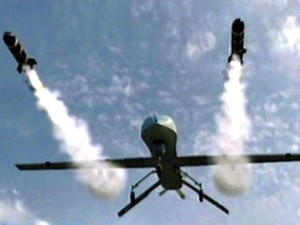 There’s been a lot of buzz lately about the Obama administration memo justifying the killing of pretty much anyone overseas who is plotting against us, including U.S. citizens. And the new weapon of choice for carrying out such assassinations is the armed aerial drone.
There’s been a lot of buzz lately about the Obama administration memo justifying the killing of pretty much anyone overseas who is plotting against us, including U.S. citizens. And the new weapon of choice for carrying out such assassinations is the armed aerial drone.
This is creating conflicting feelings on the part of many. No one wants to let the bad guys carry out their nefarious plots, or put American lives at risk unnecessarily to keep them from doing so. But it also conjures up images of a man in a darkened room adding names to his enemy kill list, and dispatching his robot minions to carryout his lethal whims.
I think it’s helpful to realize we are actually struggling with two different conundrums here. The ethics of covert government assassination, and the ethics of automated warfare. More importantly, neither of these are new. There’s lessons to be learned in the history, and maybe in that light, the seemingly intractable issues become a bit easier to chew.
Let’s start with automated warfare. Drones are not something new as much as they are the next step in a long line of military technical advances. When guns were first introduced, there was concern that you could now kill an enemy without looking him in the eye. Was their honor in that? Was it making it too easy to kill? The advent of tanks, artillery, aerial bombing runs, and missiles all heralded the same concerns about whether or not killing was becoming too easy and too impersonal. Drones are no different. The goal of warfare is simple. Inflict maximum damage on your enemy while incurring minimal damage to yourself. Weapons are developed with this in mind, and that trend is going to continue.
There’s really no point in worrying about drones per se, or even military applications of technology. As a society, we are not going to give up the benefits of technology, and as long as the need to wage war exists, technology will also be applied to that end. The key being the existence of the need to wage war. But that issue is ageless, and the nature of man is such that it’s likely your great-grandchildren will still be struggling with it in the next century. There’s no reason it should be keeping you up tonight.
In a similar vein, covert assassinations have been going on since the dawn of governments. From the ancient halls of the Roman Senate to the castles of medieval royals, to the lairs of banana republic dictators, come shadowy tales of the handiwork of spies, assassins, and “special operations” units. Fictional tales of the exploits of Seal teams, Delta Force, MI6, the CIA, and other covert groups working for the good guys are wildly popular. Think about it. Did your family ever follow-up a Saturday night viewing of Jim Phelps and his Impossible Missions team with a discussion of whether or not the mission was ethical? Did the bad guy get due process?
All except the most ardent pacifist are pretty comfortable with the notion that the bad guys get what’s coming to them, and few lose any sleep over whether or not they were tried by a jury of their peers. Did you really have any angst that Osama bin Laden was shot rather than tried? The difference is that in bin Laden’s case, and in the case of most James Bond stories, you know to a certainty the bad guys had it coming.
In the real world, the lines are much greyer. When is a guy bad enough? When is a threat imminent enough? And we are haunted by real world examples from the USSR, Cambodia, Germany, and other countries where state enemy lists were abused to as a way to control and oppress the populace.
The upshot on covert assassinations is that by and large we have no ethical issue with bad guys not getting due process. We have a trust issue with the people making decisions about who the bad guys are. And while there’s a new memo out indicating Obama’s lawyers may be doing some unprecedented legal butt covering, it’s naive to think Obama is the first President with the power to sanction a covert assassination. They all have had such power. Those self-destructing Mission Impossible tapes didn’t record themselves. So it all comes down to deciding if there’s something particularly untrustworthy about Obama or his administration that would make him more likely to abuse that power than his predecessors. That seems a more answerable question, or at least a less anxiety inducing one.

